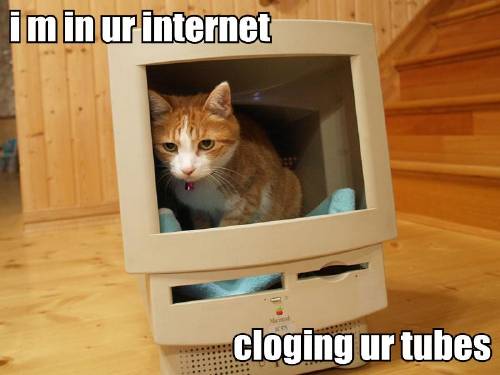Why the Internet Will Fail
 Newsweek presents a devastating essay by Clifford Stoll explaining why this newfangled Internet thing is unlikely to catch on.
Newsweek presents a devastating essay by Clifford Stoll explaining why this newfangled Internet thing is unlikely to catch on.
After two decades online, I’m perplexed. It’s not that I haven’t had a gas of a good time on the Internet. I’ve met great people and even caught a hacker or two. But today, I’m uneasy about this most trendy and oversold community. Visionaries see a future of telecommuting workers, interactive libraries and multimedia classrooms. They speak of electronic town meetings and virtual communities. Commerce and business will shift from offices and malls to networks and modems. And the freedom of digital networks will make government more democratic.
Baloney. Do our computer pundits lack all common sense? The truth in no online database will replace your daily newspaper, no CD-ROM can take the place of a competent teacher and no computer network will change the way government works.
Consider today’s online world. The Usenet, a worldwide bulletin board, allows anyone to post messages across the nation. Your word gets out, leapfrogging editors and publishers. Every voice can be heard cheaply and instantly. The result? Every voice is heard. The cacophany more closely resembles citizens band radio, complete with handles, harrasment, and anonymous threats. When most everyone shouts, few listen. How about electronic publishing? Try reading a book on disc. At best, it’s an unpleasant chore: the myopic glow of a clunky computer replaces the friendly pages of a book. And you can’t tote that laptop to the beach. Yet Nicholas Negroponte, director of the MIT Media Lab, predicts that we’ll soon buy books and newspapers straight over the Intenet. Uh, sure.
What the Internet hucksters won’t tell you is tht the Internet is one big ocean of unedited data, without any pretense of completeness. Lacking editors, reviewers or critics, the Internet has become a wasteland of unfiltered data. You don’t know what to ignore and what’s worth reading.
It goes on like this for quite some time but you get the drift. In fairness, Stoll’s piece came out fifteen years ago, yesterday. The Internet evolved considerably differently than he expected.
Three Word Chant seems to have unearthed this from the archives and Boing Boing made it viral — although I found it through Jim Henley’s Google Reader feed, the best non-blog blog you’re not reading.
At any rate, my point isn’t to make fun at Stoll for his inability to forecast the future. As has oft been said, predictions are difficult — especially about the future. No, what’s interesting is that the argument hasn’t really evolved all that much in the intervening time even though the Internet certainly has.
While telecommuting and virtual classrooms are realities, they’re still viewed suspiciously. Many of us could do our jobs almost entirely online but managers are exceedingly reluctant to cede the control that comes with being able to eyeball employees to make sure they’re working. And virtual classrooms are interesting in theory but ridiculously hard to manage.
The cacophany of voices has grown, tremendously. There were no blogs as we know them in 1995, much less Twitter, Facebook, and all the rest. And people who get paid to write still scoff at the competition from amateurs.
Online news has indeed become a major competitor for newspapers although, ironically, it’s mostly the newspapers themselves doing the competing. And they’re killing themselves. It’s true that Twitter and other technologies have been harnessed for citizen reporting of natural disasters, protest movements, and the like. But we’re not seeing the Army of Davids replacing most of the actual reporting function of professional journalism. Commentary, yes; reporting, not so much.
Reading is gradually going digital, although in the direction of booklike objects like the Kindle.
On the other hand, Stoll’s predictions about online shopping have proven wildly inaccurate. Amazon and other outlets have made a huge dent in brick and mortar sales, helping kill some major chains. It turns out that salespeople aren’t essential after all.
Stoll’s concluding thought still rings true:
What’s missing from this electronic wonderland? Human contact. Discount the fawning techno-burble about virtual communities. Computers and networks isolate us from one another. A network chat line is a limp substitute for meeting friends over coffee. No interactive multimedia display comes close to the excitement of a live concert. And who’d prefer cybersex to the real thing? While the Internet beckons brightly, seductively flashing an icon of knowledge-as-power, this nonplace lures us to surrender our time on earth. A poor substitute it is, this virtual reality where frustration is legion and where–in the holy names of Education and Progress–important aspects of human interactions are relentlessly devalued.
The online world has become a substitute, in some ways, for living in the real world. But, mostly, for people who wouldn’t have done much of the latter, anyway. For the rest of us, it’s become a positive adjunct. I’ve got plenty of friends from around the world that I either “met” online and know only from the Internet but also keep in touch with real life friends who no longer live in the same town via online communication.






Guilty as charged.
Which to me seems odd since increasingly managers are getting more and more reluctant to manage, at least in my experience. If there is an employee at work who is lazy, takes way too much time off, is better at excuses then results, is combative with co-workers and managers alike, that person is left pretty much alone whereas the conscientious worker is pressured to pick up that slack left be the former and ends of feeling resentment and angry and (because they are so conscientious) feels they are about to get fired at any moment.
I know many who write this off to “fear of litigation” but in my experience managers don’t even try, they avoid taking on the work place bully’s and goldbricks and simply hammer the those that have a sense of obligation even more. I understand it much harder to adjectivally manage workers especially when you are being pressured to perform as much or more of the work in addition to your managerial duties, but that’s why “productivity” is so high.
Working from home should be a no brainier but when mangers won’t even manage an on-site workforce, managing off-site workers is a non-starting issue (and also requires a different skill set which needs to be taught which requires training, which requires investment, blah blah).
Rick, you have a point about management but at least if everyone was working on-line managing may be easier. It has been my experience that managers hate face-to-face confrontation. The semi-anonymity of an e-mail might help the wimpier managers do their job.
It also intrigues me how fast digital books has caught on. The Kindle and B&N Nook niche is already obsolete, the iPad does books and a whole lot more. The biggest advantage I hope to see from this is in textbook publishing. Hard copy textbook prices are obscene.
On the Internet, they’ll just let anyone in. What we need is exclusivity. Gatekeepers that is what is missing, still.
Funny that pro writers lament the lack of editors on the internet. It is tough writing today. Instead of editors to refine the writers raw ore needing a lot of refining, to be successful, writers have to produce a more concentrated, pure vein. Editors and reviewers have sprung up in one form or another on the internet. I don’t think anyone is finding the dearth of critics particularly problematic.
As for human contact, well, live in person is good but being in the presence isn’t being in contact. The internet permits those who might be physically isolated due to health or other issues to interact with others. The internet permits those who are “different” that their local norm to find others like them even if that person is just a mile or a thousand miles away. Many sit right next to another and pine for just a little human contact.
It’s been my observation, if you can “tele-commute” from Baltimore to D.C., or from Boise to NYC, then someone working MUCH CHEAPER and with no fringes in say India, or South Africa can tele-commute in your place as well.
Globally, there is no lack of skilled, intelligent, and willing to work people. Language is NOT the barrier it once was. Many people can read (and even understand someone talking) in multiple languages that they may not be conversant in speaking themselves.
I can read some Chinese, does not mean I can speak it.
The “virtual” situations, like meetings and “classrooms” are evolving. It is NOT the same skill set, to teach on-line, as opposed to being in the room with a group. Many places overload the virtual classrooms, somehow, those in charge feel that “it’s not the same as “brick and mortar” buildings and “being” physically in the room.
We are still in the developmental stages of this revolution in how we communicate, and build communities, let alone how we pass information and knowledge.
Senator Ted Stevens-
” They want to deliver vast amounts of information over the Internet. And again, the Internet is not something that you just dump something on. It’s not a big truck. It’s a series of tubes. And if you don’t understand, those tubes can be filled and if they are filled, when you put your message in, it gets in line and it’s going to be delayed by anyone that puts into that tube enormous amounts of material, enormous amounts of material”
Sorry, but the picture made me do it.
Steve
Stoll was an interesting guy (wikipedia) at an interesting time. Just as internets spread out, he caught a spy, and wrote a book about it (The Cuckoo’s Egg: Tracking a Spy Through the Maze of Computer Espionage)
That bought him both geek cred, and public notoriety. It was kind of shocking therefore, when he turned out to be a crypto-luddite.
Actually, I think there is a lot of overlap between the two skill sets.
If you are an experienced in-class teacher, it’s not that hard to make the transition to online training. There are a few easy techniques that really make the online experience better for the students: make eye contact with the camera, don’t move around too much, use polls and chat rooms to get the audience involved, etc.
The core of teaching is still the same: teach task-oriented for adults, present one concept at a time, choose examples that are realistic but not too complex, etc.
I like the part lamenting the lack of gatekeepers for internet content. Oh no! No gatekeepers could lead to independent thought. It might force fact-checking and arriving at conclusions regarding what is crap and what is valid.
Thank goodness for Palin, Beck, Robertson, and all those who will still provide the intellectually stunted or lazy with stuff they can pretend to “think.”